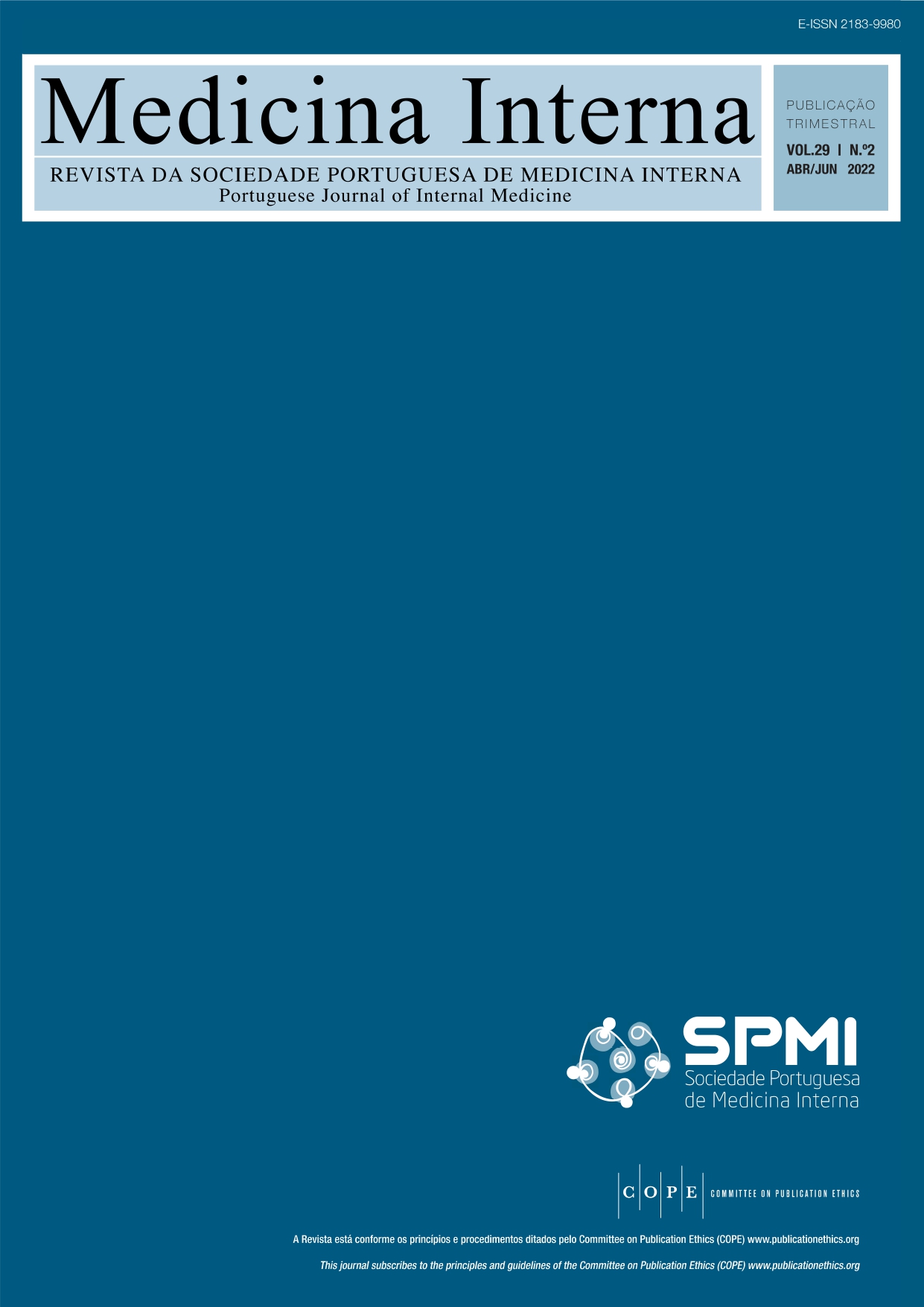Hepatitis C Treatment: What is the Impact of the SARS-CoV-2 Pandemic?
DOI:
https://doi.org/10.24950/rspmi.314Keywords:
COVID-19, Hepatitis C, Pandemic, SARS-CoV-2Abstract
Introduction: Hepatitis C virus (HCV) is an important cause of liver disease, presenting several clinical manifestations.
The discovery of direct acting antivirals has revolutionized the treatment of this infection, these new antivirals allowed the eradication of the virus in more than 95% of the cases. The SARS-CoV-2 pandemic changed the normal functioning of health services, and this could compromise this goal.
Methods: Retrospective analysis of patients treated and followed in a district hospital between January 1, 2015, and
December 31, 2020.
Results: We treated 267 patients, 77.9% men, the average
age being 50 years old. History of intravenous drug use was de risk factor in 55%. Genotype 1 was the most common (64%), 27% had liver cirrhosis and 32% had been submitted to other treatments. The average of the waiting time for treatment was 3.19 months, before the pandemic it was 3.11 months and in 2020 it was 4.15 months, this difference is statistically significant (p = 0.017). The number of patients treated over the years has been decreasing. The most used treatment was ledispasvir/ sofosbuvir. The sustained virological response was 99%. Patients were discharged in 70% of the cases.
Discussion: This retrospective study is the first, at national
level, to evaluate the impact of the SARS-CoV-2 pandemic on the treatment of HCV infection. It showed an increase in the waiting time for treatment in the year 2020. The impact of the SARS-CoV-2 pandemic on this pathology is still unclear.
Conclusion: The SARS-CoV-2 pandemic led to an increase
in the waiting time for treatment and a decrease in the number of patients with HCV infection treated, making it difficult to eradicate the virus
Downloads
References
European Association for the Study of the Liver. Electronic address: easloffice@easloffice.eu, Clinical Practice Guidelines Panel: Chair: EASL Governing Board representative: Panel members: EASL recommendations on treatment of hepatitis C: Final update of the series. J Hepatol. 2020;73:1170–218.
World Health Organization. Interim guidance for country validation of viral hepatitis elimination [Internet]. Geneva: World Health Organization; 2021 [citado 29 de novembro de 2021]. Disponível em: https://apps.who.int/iris/handle/10665/341652
World Health Organization. Guidelines for the care and treatment of persons diagnosed with chronic hepatitis C virus infection [Internet]. Geneva: World Health Organization; 2018 [citado 29 de novembro de 2021]. 84 p. Disponível em: https://apps.who.int/iris/handle/10665/273174
Pol S, Lagaye S. The remarkable history of the hepatitis C virus. Genes Immun. de 2019;20:436–46. doi: 10.1038/s41435-019-0066-z.
Hu W, Zhang C, Shi JJ, Zhang JY, Wang FS. Hepatitis C: milestones from discovery to clinical cure. Military Med Res. 2020;7:59. doi: s40779-020-00288-y.
Flisiak R, Zarebska-Michaluk D, Frankova S, Grgurevic I, Hunyady B, Jarcuska P, et al. Is elimination of HCV in 2030 realistic in Central Europe. Liver Int. 2021;41 Suppl 1:56-60. doi: 10.1111/liv.14834.
Blach S, Kondili LA, Aghemo A, Cai Z, Dugan E, Estes C, et al. Impact of COVID-19 on global HCV elimination efforts. J Hepatol. 2021;74:31-6. doi: 10.1016/j.jhep.2020.07.042. .
Anjo J, Café A, Carvalho A, Doroana M, Fraga J, Gíria J, et al. O impacto da hepatite C em Portugal. GE J Port Gastrenterol. 2014;21:44–54.
Buti M, Domínguez-Hernández R, Casado MA. Impact of the COVID-19 pandemic on HCV elimination in Spain. J Hepatol. 2021;74:1246-8. doi: 10.1016/j.jhep.2020.12.018.
Downloads
Published
How to Cite
Issue
Section
Categories
License
Copyright (c) 2022 Medicina Interna

This work is licensed under a Creative Commons Attribution-NonCommercial 4.0 International License.
Copyright (c) 2023 Medicina Interna






